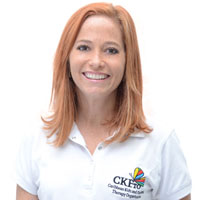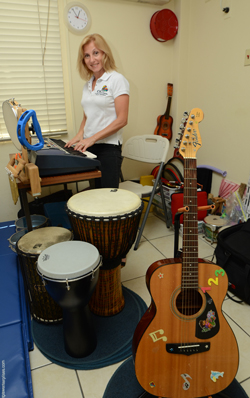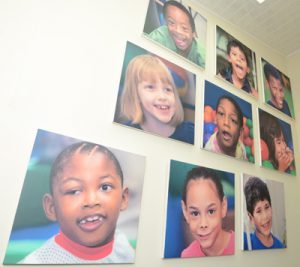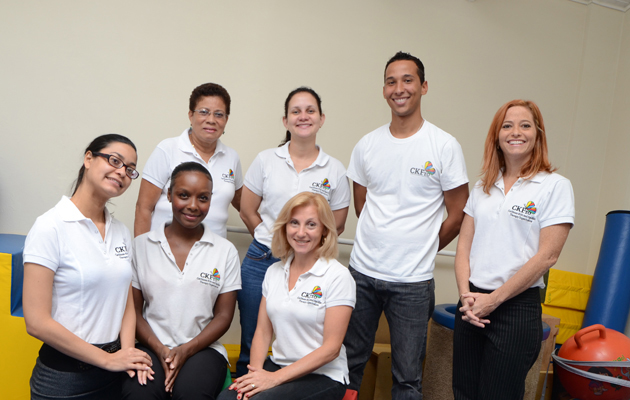For a parent of a child with disabilities, the world can seem very limiting and frustrating.
It is this first-hand knowledge and experience that led to the formation of Caribbean Kids and Family Therapy Organisation (CKFTO).
CKFTO began in 2009 as a dream between a mother of a child with disabilities, Laura Pierre-Escayg, and an occupational therapist, Sara Stephens. Together, they formed a non-profit multi-disciplinary clinic focused on serving families with children of all kinds of disabilities.
There are so many challenges the family faces just to help the child to lead a normal life“The founders had a clear picture of what they wanted, and I also strongly believe in it,” says Krista Hamel-Smith, the General Manager of CKFTO.
Krista, who has always been interested in working with non-governmental organisations (NGOs), leapt at the opportunity to join the CKFTO family.
“There are so many challenges the family faces just to help the child to lead a normal life. Sometimes, getting therapy on top of that — it’s just too much,” she says. “CKFTO functions as that bridge that can help the child function to the best of his or her abilities and lead a joyful life.”
CKFTO: Therapy with a difference
CKFTO provides paediatric assessment and direct treatment for children experiencing developmental, physical, cognitive, behavioural, emotional, learning, social, and communicational challenges.
Part of its holistic approach to treatment is the inclusion of parents, siblings, schools and the wider community. This all-encompassing reach allows CKFTO to treat the complete person and help the child to realise its fullest potential.
Inclusion of parents, siblings, schools and the wider community
The goal of CKFTO is to reach as many families and children in T&T, especially those who struggle to make ends meet.
Families are referred to CKFTO from doctors or other therapists that see the children, or through the various associations for those with special needs. Often, families hear about the clinic through other families, or through searching online and finding their website www.ckfto.org; or their Facebook page, which offers a vast collection of tips and information.
“Families are in dire need, so parents are always searching desperately for something — anything — that can help their child,” says Krista. “We are fortunate to be able to provide for those who may not be able to access private care due to financial constraints.”
Parents are always searching desperately for something — anythingWhile the clinic does not offer services for free, great emphasis is put upon keeping the cost as low as possible for families in need.
“Families are invited to complete and submit a financial assistance document before an assessment or services are provided,” explains Krista. “Based on the family’s income, financial payment will then be decided on a sliding scale. Often, low-income families are able to pay only about TT$60 per session — whereas about TT$300 would be the average for any other therapy practice.”
Another of the key problems these families face is access to therapy services, which is one of the issues CKFTO aims to address.
“There are so many remote areas, where communities may not even know about all the available resources,” adds Krista.
“Even if they do know about what we offer, getting to therapy presents a challenge — regular public transport is sometimes not an option, particularly when the child has special needs.”
Therapy & Support Programmes at CKFTO
On average, CKFTO delivers more than 300 therapeutic sessions monthly, servicing more than 100 children and families each month. Based on the initial assessment, each child would do rotations through the types of therapy available.
- Occupational Therapy involves the therapeutic use of purposeful and meaningful activities to promote health and wellness. It focuses on the promotion of fine motor, perceptual, cognitive and developmental skills in children with various levels of special needs and learning differences.
-

Maya Chriqui, Clinical Supervisor and music therapist Music Therapy uses music as a therapeutic tool to restore, maintain and/or improve a child’s physical, emotional, social, cognitive and psychological well-being.
- Aqua Therapy uses the buoyancy of water to facilitate movements that are not achievable outside the aquatic environment. The hydrostatic pressure of the water provides a blanket of deep pressure to the child’s largest organ: the skin. Unique properties of the water allow children to work on development skills such as crawling, walking, rolling and jumping.
CKFTO also recognises the importance of supporting the child’s family, and hosts various support groups and programmes to help family members understand they are not alone. These include:
- HOPE (Helping Our Parents to become Empowered) Support Group
A parental/caregiver support group for families of children with special needs, where parents can come to find out parenting tips, information, solutions, education, support and understanding.
- Sibshops ®
A support group for children with siblings with special needs. Sibshops ® are best described as opportunities for brothers and sisters who have a sibling with special needs to obtain peer support and education within a recreational setting.
- The Alert Programme (8 weeks)
An occupational therapy group to teach children to self-regulate at home, school and in the community. The Alert Program assists children in understanding the basic theory of sensory integration related to arousal states. The primary focus is to help children learn to monitor, maintain and change their level of alertness so that it is appropriate to a situation or task.
- Sensational Kid (10 weeks)
This programme aims to identify and implement success oriented strategies for regulating sensory based needs, increasing and strengthening gross motor skills needed for strength, coordination and balance; as well as fine motor skills needed for eating, dressing and handwriting.
- Motor Group (12 weeks)
An informative, supportive and interactive program for parents/caregivers and children to experience, learn and practice increased range of motion, sustained movement and motor planning using occupational and music therapy based techniques. Aimed at children struggling with handwriting issues or now getting ready for the challenge of school, the programme is designed to assess and improve a child’s handwriting abilities for increased efficiency, improved legibility and decreased frustration at home and school.
- Learning through Integration of Meaningful Experiences (LIME) (10 weeks)
A music therapy based group program that focuses on using music therapy techniques to develop/maintain/strengthen skills in social, cognitive, emotional and psychological areas of development within a safe and success oriented group experience.
CKFTO also offers an extensive library of recommended therapeutic books, CDs and DVDs for families, teachers and professionals to access.
Raising awareness about disabilities
Beyond the direct treatment groups offered at CKFTO, the clinic works diligently to spread awareness about disabilities to the general public, with a particular focus on children.
Spread awareness about disabilities
One of these efforts is the Count Me In ® puppet show, which uses child-size multicultural puppets that portray children with disabilities. Through this demonstration, the puppets help to dispel myths and fears about people with disabilities.
“The campaign is not about any one disability but for the benefit of the country,” explains Krista.
“The puppet show goes to schools free of charge, and gives children an opportunity to ask questions. People are always afraid of what they don’t know, so by having children learn about these from a very young age, we are changing the way the country sees disabilities.”
Another aspect of community education is teacher training.
“Many of these children go to mainstream schools, and may be labelled as disruptive or difficult if the teacher does not understand how to deal with them,” adds Krista. “There are simple solutions to some of these problems, so it is important for the teacher to know how to identify some of these problems the children face.”
CKFTO has also partnered with The National Centre for Persons with Disabilities (NCPD), working on social integration of teenagers and adults to help the differently-abled to graduate from a ‘disabled child’ into a successful adult with skills that can be employable.
It warms my heart, just seeing the children reaching a milestoneThis partnership forms the programme sponsored by REPSOL, Social Integration of Persons with Disabilities, and is an awareness campaign that aims to create national awareness regarding disabilities.
“It is always a struggle, at every step of the way,” notes Krista.
“There is so much that needs to be done, and only so much that we can do. But what we are able to do, what we have been able to do so far — it warms my heart, just seeing the children reaching a milestone, and knowing that our therapists are making a difference. It is so important for each and every one of us to do what we can, to be part of something bigger.”
Further Information
- If you want to be part of something bigger, get involved with CKFTO’s “Sponsor A Child” programme, an opportunity for individuals and organisations to make a small commitment to one child in need. This sponsorship covers the cost of transportation, therapy, and equipment devices such as a language learning tool.
- CKFTO always welcomes volunteers, particularly for the Count Me In ® puppet show, summer camps and support groups.

